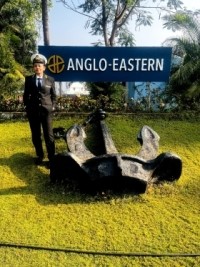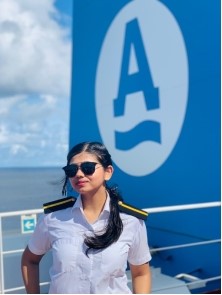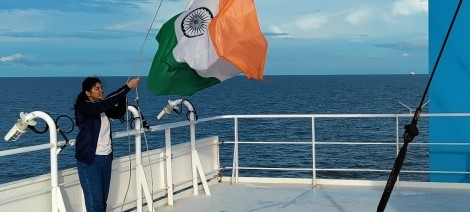Celebrating International Women’s Day with Ardmore Cadet, Anwesha Das
Back to newsThe maritime industry is one that has historically lacked gender diversity. However, this is changing as more women pursue careers in the field. Improving diversity in shipping has been a core priority of Ardmore’s over recent years, resulting in our participation in a variety of initiatives. This includes the Diversity Study Group (DSG) – the first organisation dedicated to diversity, equity, and inclusion (DEI) in the workplace across the global shipping and maritime sectors.
After joining the DSG, Ardmore played a leading part in the initiation of a charter that would allow signatories to make a public commitment to DEI across the industry. With the subsequent involvement and support of the Global Maritime Forum, this idea was realised through the recently-launched All Aboard Alliance.
Ardmore believes that nurturing and supporting talent is crucial to its success as a company, and DEI is an essential part of this. Together with our partners, we are working to attract women into the seafaring community, while addressing other core aspects of diversity.
On International Women’s Day 2023, we’d like to take the opportunity to highlight the invaluable role women play in our team of dedicated sea staff. Anwesha Das, an Ardmore Bursary Cadet who joined her first vessel in June 2022 after completing pre sea training at Anglo Eastern training academy at Karjat, India, shares her experience as a woman in maritime – and highlights the increasingly gender-equal space the industry is becoming as various challenges are addressed.
What attracted you to the maritime industry?
Everyone I knew when I was younger worked normal jobs, with fixed routines and timings. One day, I saw a social media post titled “Life of a merchant navy officer”. The post led me to investigate the seafarer lifestyle – I was intrigued. I began contacting seafarers on board to learn more about the reality of the job, and soon realized that a career at sea was well suited to me. It wasn’t long before I had ambitions to navigate ships as a profession – sailing through the ocean and carrying cargo that contributed to global trade.

Where did you complete your maritime training?
I completed my pre-sea training at Anglo Eastern Maritime Academy, a maritime institute in India. Whilst there I studied for a Diploma in Nautical Science, which combined theoretical and practical knowledge to prepare me for life at sea.

What do you enjoy about your role at Ardmore?
One of my favorite aspects of life onboard an Ardmore ship is the culture. I have the opportunity to learn from every one of my colleagues and everything I do, with the senior officers, deck crew and engineers offering support each step of the way. There is also a strong culture of safety onboard Ardmore ships, which is incredibly reassuring, particularly as everyone not only prioritizes their own safety, but that of others around them.
Moreover, I appreciate the way in which Ardmore takes good care of their crew. I have seen many of my batchmates at other companies struggle with timely signoff. However, when I had to signoff recently due to an emergency, the request was promptly actioned by Ardmore.
What are some of the greatest challenges you’ve experienced in your career and how did you overcome them?
Initially, I struggled to connect with my fellow crewmates and officers, particularly as I was hesitant to asks questions and ask for help. Luckily, after speaking to my superiors about my concerns, they provided me with more guidance and support. I am now more confident to seek help and connect with my crewmates on a professional level.

What changes do you believe the maritime industry needs to implement to increase levels of gender equality?
I believe that increased education and training is key to shifting attitudes around gender in the maritime industry. It is therefore great to see organizations, like the Indian Administration, making the likes of gender sensitization training mandatory for all seafarers.
In the future I hope to see a developed network of female seafarers, who can assist each other in navigating the training process and challenges that may arise. I also believe that it would be beneficial if companies prioritized the placement of female seafarers together, onboard the same ships. I am currently placed alongside a female Third Officer, who guides me on certain things and provides professional support.
Female seafarers still make up a minority of the global crew, however things are changing for the better. Do you have any thoughts on this?
Things are definitely changing for better, with new guidelines and regulation ensuring that women in maritime are comfortable on board. It is great that discussions are taking place on board around the treatment of women at sea, with specific attention paid to developing a healthy culture onboard.
I believe this change is truly encouraging, with gender diversity in the industry only set to improve as more barriers are broken down and the culture develops further.



Is there any advice you’d offer women who experience challenges in their careers relating to their gender?
I would advise women to be resilient in the face of challenges, learning how to overcome these situations appropriately and ensuring that they do everything in their power to develop their careers despite the obstacles they may face.
What has been your greatest achievement at sea?
I am incredibly proud of my career so far. I’m proud of how adaptable I’ve become. Not only have I adapted to the practicalities of life at sea, but I have also become stronger, more confident, and more resilient.

If you ever moved ashore, what would you miss most about working at sea?
I would miss the parties, celebrating holidays on board the ship, and of course the special “Sunday Biryani” the crew enjoys every week. I would also miss the dynamic environment of life at sea and never knowing what the next day is going to bring.


What advice would you give to other women wanting to join the maritime industry?
I would tell them that while there may be challenges, we must have the courage to overcome them gracefully. It is often these hurdles that teach us the most and allow us to grow. On a similar note, I would advise women to seize every learning opportunity they can, as this will allow them to progress their career even faster.




